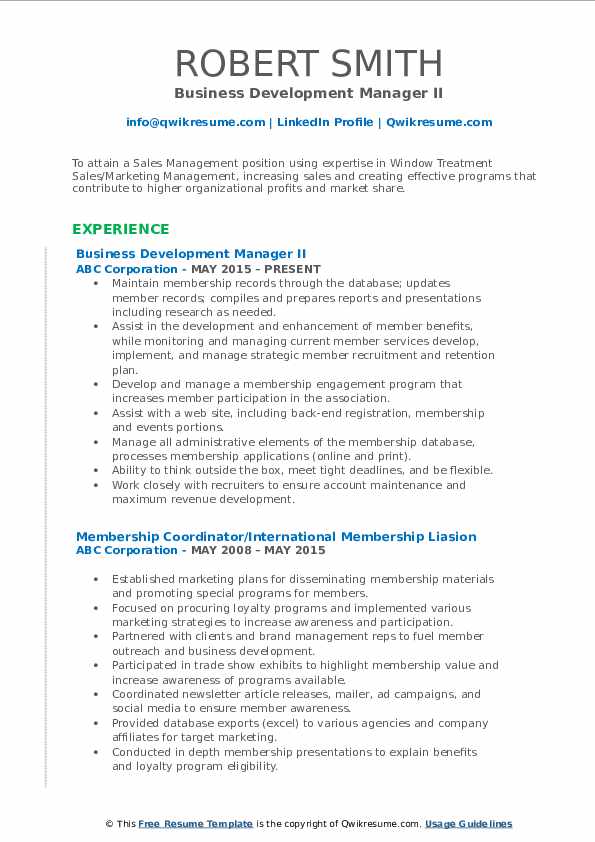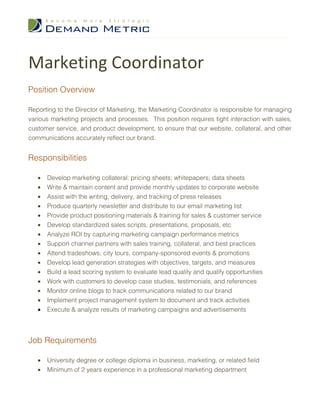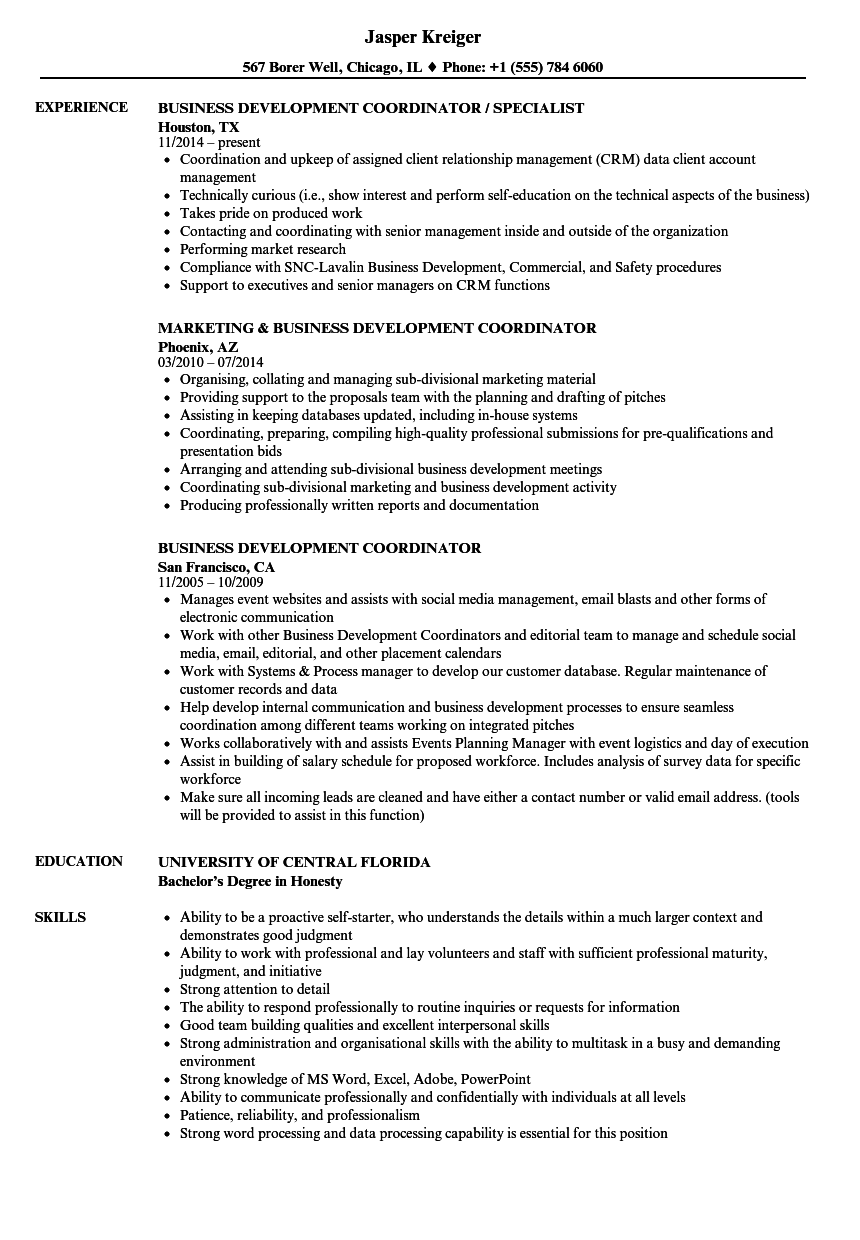Role and Responsibilities of a Business Development Coordinator. Discover The key role of a Business Development Coordinator! Learn about their responsibilities in driving growth. Building relationships, & enhancing business strategy.
What is Role & Responsibilities of a Business Development Coordinator & how does it work?
A Business Development Coordinator supports business growth strategies. This role involves analyzing market trends. Coordinators identify potential opportunities & client needs. They assist sales teams by providing necessary data. Connecting with clients helps develop strong relationships.
Brief history of Role & Responsibilities of a Business Development Coordinator
How To implement Role & Responsibilities of a Business Development Coordinator effectively
Key benefits of using Role & Responsibilities of a Business Development Coordinator
Challenges with Role & Responsibilities of a Business Development Coordinator & potential solutions
Future of Role & Responsibilities of a Business Development Coordinator
Table of Role & Responsibilities of a Business Development Coordinator
| Responsibility | Description |
|---|---|
| Market Analysis | Assess trends & identify opportunities. |
| Client Engagement | Establish & maintain strong relationships. |
| Data Management | Organize & interpret sales data. |
| Collaboration | Work with multiple departments effectively. |
| Strategy Development | Create plans for market expansion. |

Understanding Role of Business Development Coordinator
A Business Development Coordinator plays an essential part in driving growth for an organization. By identifying opportunities. Enhancing partnerships, & supporting sales teams. This role significantly contributes To revenue generation. Business Development Coordinators assist executives in strategizing & implementing initiatives tailored To market demands. To explore a detailed job description. Visit this link.
Key Responsibilities in Business Development
The primary responsibilities typically encompass a variety of tasks aimed at achieving strategic goals. Coordinators conduct market research & analysis To identify emerging markets. Moreover. Monitoring competitor activities & evaluating industry trends becomes crucial for maintaining a competitive edge. This research empowers decisionmaking processes & strategic planning.
Another core duty involves fostering relationships with potential clients & partners. Establishing rapport assists in understanding client needs & tailoring solutions accordingly. Coordinators often initiate outreach programs. Organizing meetings & presentations. Building strong networks enhances opportunities for collaboration & growth.
Furthermore. Business Development Coordinators support sales teams with administrative tasks. This includes managing correspondence. Scheduling appointments, & preparing reports. Such support allows sales executives To focus on closing deals. Ultimately driving organizational success.
Market Research & Analysis
Conducting thorough market research forms a vital aspect of business development. Identifying potential markets requires analyzing demographic data. Purchasing behavior, & preferences. This research assists in creating accurate customer profiles that guide tailored marketing strategies. Moreover. Collecting data on competitors provides insights into their strengths & weaknesses.
Analysis also extends To identifying emerging trends. Understanding market shifts enables organizations To adapt quickly. Capitalizing on new opportunities. Implementing tools like SWOT analysis can further refine insights. Ensuring strategic planning aligns with market conditions.
Utilizing analytical software or CRM systems enhances data management & accessibility. Proper documentation allows for easy reference when making crucial business decisions. Staying informed about industry advancements ultimately positions an organization as a market leader.
Client Relationship Management
Building & maintaining client relationships ranks high among responsibilities. Effective communication fosters trust. Essential for longterm partnerships. Coordinators often serve as liaisons between clients & internal teams. Clear communication ensures both parties remain aligned throughout project cycles.
Regular followups contribute significantly To relationship management. Scheduling checkins & sharing updates keeps clients informed. This proactive approach demonstrates commitment To client satisfaction & enhances loyalty. Leading To future opportunities.
Using CRM software can assist in tracking client interactions & preferences. A wellmaintained CRM system facilitates followups. Ensuring no client feels neglected. Personalizing communication based on past interactions strengthens relationships further.
Sales Support & Strategy
Providing sales support is another critical responsibility. Coordinators prepare sales materials. Including presentations & promotional content. Such materials equip sales teams with tools necessary for successful meetings. Wellprepared documentation enhances professionalism & aids in closing deals.
Additionally. Coordinators help develop sales strategies. Participating in brainstorming sessions fosters collaboration among teams. Crossfunctional partnerships ensure all perspectives are considered during strategy development.
Monthly sales reports give insights into team performance & areas for improvement. By analyzing these reports. Coordinators can identify trends & make recommendations To optimize processes. Continuous evaluation ultimately drives better sales results.
Organizing Events & Meetings
Organizing events plays a crucial role in business development. These events present opportunities for networking & showcasing services. Coordinators often handle logistics. Ensuring everything runs smoothly. This attention To detail reflects a company’s professionalism & commitment.
Meetings also form an essential component of this role. Coordinators schedule & facilitate meetings between clients. Partners, & internal teams. Providing clear agendas ensures meetings remain productive & focused on key objectives.
Evaluating event success through feedback helps refine future strategies. Gathering insights from participants contributes valuable perspectives. Continuous improvement in event management enhances reputation & expands opportunities.
Collaborating with Marketing Teams
Collaboration with marketing teams is vital. Coordinators work closely with marketers To develop promotional campaigns. Understanding campaigns ensures message consistency across all platforms. Coordinated efforts amplify reach & engagement. Driving potential customer interest.
Coordinators also analyze campaign performance metrics. Assessing data helps determine what strategies yield The highest ROI. This information aids in optimizing future marketing endeavors. Ensuring resources are allocated effectively.
Creativity within marketing initiatives remains essential. Coordinators contribute unique ideas. Enhancing marketing efforts. Brainstorming sessions generate innovative concepts. Fostering a culture of continuous improvement.
Monitoring Industry Trends
Staying informed about industry trends proves crucial for success. Coordinators must continuously monitor shifts in consumer preferences & technology advancements. This knowledge informs strategic planning & drives adaptability within organizations.
Networking with industry professionals also aids in gaining insights. Attending conferences & workshops encourages knowledge sharing. Engaging with experts exposes coordinators To new ideas & practices. Enhancing skill sets.
Utilizing social media platforms for research further enhances trend analysis. Following industry leaders & influencers keeps professionals updated on market dynamics. Engaging with content fosters growth & builds a robust professional network.
Data Management & Reporting
Efficient data management remains crucial in a Business Development Coordinator’s role. Coordinators collect. Analyze, & present data relevant To business initiatives. Reports typically highlight key performance indicators & progress towards goals.
Maintaining a centralized database ensures easy access To information. Organizing data logically aids team collaboration & decisionmaking processes. Efficient data tracking enhances transparency & accountability across departments.
Regular reporting intervals provide necessary updates for stakeholders. Effective communication fosters trust & keeps all parties informed on progress. Streamlined reporting processes ultimately enhance operational efficiency.
Strategic Planning & Implementation
Strategic planning represents an integral aspect of development roles. Coordinators assist executives in crafting business strategies aligned with organizational goals. Comprehensive planning considers market conditions. Available resources, & future ambitions.
Implementation of strategies requires a share of responsibilities. Coordinators ensure that all departments are aware of their roles. Clearly defined objectives & timelines foster accountability & momentum. Regular status updates keep everyone aligned with overarching goals.
Evaluation of strategic initiatives occurs regularly. Analyzing results against projections informs future adjustments. Flexibility To adapt strategies ensures continued growth & success within competitive environments.
Financial Analysis & Budget Management
Financial analysis aids in making informed decisions. Coordinators analyze budgets allocated for various projects. Understanding financial constraints supports effective planning & resource allocation.
Regular budget evaluations identify possible overspending. By analyzing expenses against projected budgets. Coordinators provide crucial insights. This financial oversight enhances accountability & supports sustainability.
Creating financial forecasts assists in preparing for future endeavors. Predicting income or project costs provides a clearer picture of potential outcomes. Such foresight minimizes risks associated with financial uncertainties.
Team Collaboration & Dynamics
Team collaboration significantly affects overall performance. A Business Development Coordinator must foster teamwork among diverse groups. Encouraging open communication promotes idea sharing & innovation.
Facilitating teambuilding activities enhances relationships among colleagues. Strong interpersonal connections lead To increased productivity & morale. Coordinators often organize workshops or training sessions. Improving team dynamics.
Regularly soliciting feedback strengthens collaboration. Listening To team members & valuing their opinions fosters inclusivity. Inclusive environments enhance creativity & lead To better problemsolving.
Problem Solving & Conflict Resolution
Effective problemsolving skills are crucial in this role. Identifying challenges early prevents escalation. Coordinators assess situations strategically. Providing viable solutions that meet everyone’s needs.
Approaching conflicts with an open mind promotes constructive dialogue. Mediating disputes helps maintain positive relationships among team members. Encouraging understanding fosters a culture of collaboration & respect.
Continuous evaluation of processes ensures longterm improvement. Learning from past issues & implementing changes leads To better outcomes. This proactive approach enhances overall team effectiveness.
Professional Development & Training
Commitment To personal growth is essential for success. Coordinators should pursue ongoing training & certifications. Expanding skills aligns with industry changes. Ensuring relevance in competitive markets.
Mentorship opportunities can provide valuable insights. Engaging with seasoned professionals offers guidance & encouragement. This relationship fosters learning & opens new avenues for career advancement.
Participating in workshops or conferences enhances industry knowledge. Gaining insights from experts contributes To better job performance. Engaged professionals continually seek ways To improve their contributions.
Measuring Success & Performance Metrics
Success measurement directly impacts business growth. Establishing performance metrics aligns team efforts with organizational goals. For coordinators. Regularly reviewing metrics informs necessary adjustments.
Creating specific. Measurable goals sets clear expectations. Regular evaluations of performance against goals enhance accountability. This ongoing assessment promotes a culture committed To continuous improvement.
Engaging with stakeholders during performance reviews fosters transparency. Sharing successes & concerns ensures collective understanding of progress. This engagement supports shared objectives & keeps focus aligned.
- Identifying new opportunities for growth 📈
- Building & maintaining client relationships 🤝
- Analyzing market trends & competitor actions 📊
- Developing sales strategies & tactics 🎯
- Organizing & facilitating events & meetings 🎉
- Collaborating with marketing for campaigns 🗣️
- Monitoring performance metrics & success rates 📋
Experience in Business Development
My experience in business development aided my growth immensely. Working closely with various departments allowed me To gain insights into different roles. I honed my skills in client relations. Sales support, & data management through handson experiences. Such exposure provided a wellrounded perspective on effective business strategies.

Role & Responsibilities of a Business Development Coordinator
Overview of Business Development Coordination
A Business Development Coordinator plays a crucial role in driving growth. This position involves identifying new opportunities for expansion. Candidates should showcase strong analytical skills & excellent communication abilities. Oftentimes. They must work closely with other departments. Collaboration helps improve overall company performance. Business Development Coordinators support initiatives that aim at increasing market share & revenue.
This role requires an understanding of both sales & marketing strategies. Coordinators often craft proposals & presentations tailored for potential clients. Developing strong relationships becomes essential for success in this position. Gathering & analyzing market information also forms part of their responsibilities. Keeping up with industry trends ensures informed decisionmaking.
Professionals in this role should be proactive & selfmotivated. They need exceptional organizational skills for managing various tasks. Flexibility & adaptability play significant roles in adjusting To changing demands. Many corporations consider experience in project management beneficial. Overall. A Business Development Coordinator’s contribution remains vital for longterm success.
Key Responsibilities
Business Development Coordinators focus on a variety of responsibilities. Conducting market research forms a central task. This research helps identify target markets & potential customers. Generating leads requires persistence & creativity. Coordinators must implement strategies that foster interest from prospects. Networking events & trade shows often prove valuable opportunities.
Communication serves as an essential element in this role. Coordinators need clear & concise interactions with team members & stakeholders. Drafting reports & presentations for management becomes commonplace. Maintaining databases filled with client information is also crucial. Organizing & analyzing this data aids strategic decisions.
Additionally. These professionals handle followups with clients. Building rapport through continuous interaction enhances relationships. Collaborating with marketing teams leads To successful campaigns. Coordinators assist in developing promotional materials & content. They play critical roles in ensuring campaigns align with company goals.
Skills Required
Strong interpersonal skills remain vital for a Business Development Coordinator. This role demands individuals able To engage effectively with diverse audiences. Verbal & written communication skills should be topnotch. An ability To present ideas compellingly enhances chances of success. Problemsolving skills help navigate complex situations gracefully.
Analytical thinking serves as another key skill. Coordinators must assess data critically while making informed decisions. Familiarity with project management tools boosts efficiency. Time management capabilities ensure deadlines remain realistic & achievable. These professionals should prioritize tasks effectively while multitasking.
Technical skills become necessary for maximizing productivity. Proficiency in CRM software assists in managing client interactions. Coordinators often utilize data visualization tools for reporting purposes. Adaptability To new technologies leads To innovation. Passion for learning keeps skills sharp & relevant.
Educations & Qualifications
A bachelor’s degree often serves as a minimum requirement. Preferred fields include business administration. Marketing. Or related areas. Relevant coursework equips graduates with necessary knowledge. Some organizations may value certifications highlighting additional qualifications. Continuous education remains vital due To evolving industry trends.
Experience in sales or marketing enhances suitability for this role. Internships provided during college years might prove beneficial. Gaining handson knowledge helps set candidates apart. Many employers look for demonstrated success in previous positions. Relevant work experiences strengthen an individual’s resume.
Networking proves valuable throughout a career. Attending industry conferences & events builds connections. Networking can lead To job opportunities & mentorships. Completing business development courses boosts credibility. Many professionals enroll in workshops for skill enhancement.
Collaboration with Other Departments
Collaboration among departments yields favorable results. A Business Development Coordinator liaises with marketing teams primarily. This partnership ensures consistency in messaging & branding. Together. They craft campaigns catering To specific target audiences. Ongoing communication fosters trust & mutual understanding.
Coordination with sales teams also holds importance. Both departments must share common goals for optimal performance. Sales teams provide feedback regarding customer interactions. This feedback helps refine strategies & enhance effectiveness. Working alongside product teams assists in understanding offerings better.
Crossdepartment collaboration leads To innovative solutions. Regular meetings create opportunities for brainstorming ideas. Sharing insights from different perspectives enhances project success. Encouraging a teamoriented environment fosters enthusiasm & engagement. Joint efforts cultivate a sense of community within organizations.
Understanding Market Dynamics
Monitoring competitors serves as a critical responsibility. Business Development Coordinators assess competitor strategies & market positioning. Understanding competitors helps identify unique value propositions. Analyzing their strengths & weaknesses allows for effective positioning.
Market trends can shift rapidly. Coordinators must remain vigilant about changes. Identifying emerging trends positions organizations advantageously. Conducting surveys & interviews delivers insights into customer preferences. Understanding consumer behavior aids in developing responsive strategies.
A comprehensive analysis of market dynamics is essential. Using tools & resources helps gather relevant data. Keeping abreast of economic indicators informs decisions. This understanding allows for strategic adjustments enhancing competitiveness. Knowledge of regulations also shapes development strategies & decisionmaking.
Utilization of Technology
Technology plays a vital role in business development. Automation tools increase efficiency & save time. Coordinators often use project management software for streamlined workflows. These systems help organize tasks & deadlines effectively. Familiarity with data analysis tools enhances decisionmaking capabilities.
Digital marketing tools aid in reaching target audiences. Social media platforms become vital for engagement & networking. Email marketing platforms assist in reaching clients quickly & effectively. Search engine optimization strategies help increase visibility online. Staying updated on advancements remains crucial for success.
CRM systems enable better customer relationship management. Tracking interactions allows for personalized communication. Coordinators leverage technology for streamlined data analysis. Datadriven decisions significantly enhance development strategies. Overall. Technology integration leads To higher productivity & effectiveness.
Importance of Networking
Networking plays a crucial part in a Business Development Coordinator’s success. Building relationships helps create valuable connections. Participating in industry events opens doors for collaboration. Networking expands potential client bases & partnership opportunities. A robust network provides insights & resources often beneficial for growth.
Active engagement on social media platforms fosters connections. Coordinators should share knowledge. Experiences, & insights. Joining professional organizations helps individuals stay informed. Networking with industry peers leads To discovering best practices. Continuous interaction nurtures longterm professional relationships.
Mentorship also stems from effective networking. Experienced professionals can provide guidance & support. Maintaining communication with mentors can accelerate career growth. Networking ultimately extends beyond initial contacts. Genuinely building relationships cultivates opportunities longterm.
Challenges Faced
A Business Development Coordinator encounters various challenges regularly. Competition remains fierce across almost every industry. Identifying unique value propositions becomes essential for standing out. Coordinators must develop innovative strategies for attracting clients. Constantly refining approaches helps overcome competition.
Market fluctuations pose additional difficulties. Economic uncertainties can affect overall performance significantly. Coordinators must stay adaptable when external factors impact clients. Constantly recalibrating strategies ensures alignment with client needs. Time management challenges arise when facing multiple projects simultaneously.
Coordinators often struggle with balancing shortterm & longterm goals. Immediate demands may conflict with broader objectives. Finding a sweet spot requires emphasis on prioritization. Aligning efforts with The organization’s mission secures overall success. Strengthening resilience helps navigate through challenging circumstances.
Comparison Table
| Responsibility | Description | Importance |
|---|---|---|
| Market Research 📊 | Identifying trends & competition | Essential for informed decisions |
| Client Interaction 💬 | Building strong relationships | Drives business growth |
| Proposal Development 📝 | Crafting compelling business proposals | Critical for winning contracts |
| Collaboration 🤝 | Working with sales & marketing | Ensures unified strategy |
Realworld Experience
My venture as a Business Development Coordinator involved diverse tasks. Building relationships with clients shaped my professional viewpoint. Interactions broadened my understanding of market dynamics. Managing projects fostered skills in leadership & organization. Each day brought unique challenges & opportunities.
Conclusion Note
This article expands on a Business Development Coordinator’s role. Understanding essential responsibilities remains key for aspiring professionals. Continuous growth in this field requires dedication & adaptability.
What is The primary role of a Business Development Coordinator?
The primary role of a Business Development Coordinator is To support The business development team in identifying & pursuing new business opportunities. Maintaining client relationships, & assisting in The development of proposals & marketing strategies.
What skills are essential for a Business Development Coordinator?
Essential skills for a Business Development Coordinator include strong communication & interpersonal skills. Excellent organization & time management abilities, & proficiency in research & data analysis. Additionally. Knowledge of The industry & sales techniques is beneficial.
How does a Business Development Coordinator contribute To market research?
A Business Development Coordinator contributes To market research by gathering & analyzing data on market trends. Competitor activity, & potential clients. This information helps The team make informed decisions about target markets & strategies.
What types of tasks does a Business Development Coordinator handle on a daily basis?
A Business Development Coordinator handles a variety of tasks including scheduling meetings. Preparing presentations. Drafting proposals. Maintaining databases, & helping with The execution of marketing campaigns.
How important is communication in The role of a Business Development Coordinator?
Communication is crucial for a Business Development Coordinator as they often serve as a liaison between The business development team. Clients, & other departments. Effective communication ensures that information is conveyed clearly & fosters strong relationships.
What strategies do Business Development Coordinators use To generate leads?
Business Development Coordinators use strategies such as networking. Attending industry events. Utilizing social media, & conducting outreach through email or phone calls To generate leads & identify potential clients.
How does a Business Development Coordinator assist with client proposals?
A Business Development Coordinator assists with client proposals by gathering relevant data. Drafting content. Coordinating with team members To ensure accuracy, & creating professional documents that meet client needs.
What role do Business Development Coordinators play in maintaining client relationships?
Business Development Coordinators play a key role in maintaining client relationships by regularly following up. Addressing client inquiries, & ensuring that services provided meet client expectations. Fostering longterm partnerships.
How do Business Development Coordinators track progress & success?
Business Development Coordinators track progress & success by maintaining detailed records of leads. Opportunities, & client interactions using CRM software. As well as analyzing key performance indicators To measure effectiveness.
What role does collaboration play in a Business Development Coordinator’s responsibilities?
Collaboration is important for a Business Development Coordinator as they often work closely with sales. Marketing, & project management teams To align strategies & ensure cohesive efforts towards achieving business objectives.
Can a Business Development Coordinator influence company strategy?
A Business Development Coordinator can influence company strategy by providing insights from market research & client feedback. Which can inform decisionmaking & help shape The direction of business initiatives.
What tools & software do Business Development Coordinators commonly use?
Business Development Coordinators commonly use tools & software such as Customer Relationship Management (CRM) systems. Project management software, & data analysis programs To streamline processes & enhance productivity.
How do Business Development Coordinators handle lead followups?
Business Development Coordinators handle lead followups by promptly reaching out To potential clients via email or phone. Tracking interactions, & ensuring that followup actions are taken based on client responses & needs.
What role does time management play in The daily tasks of a Business Development Coordinator?
Time management is essential for a Business Development Coordinator as they often juggle multiple tasks & deadlines. Effective time management ensures that all responsibilities are completed on schedule & that opportunities are maximized.
Why is understanding industry trends important for a Business Development Coordinator?
Understanding industry trends is crucial for a Business Development Coordinator as it enables them To identify new opportunities. Anticipate challenges, & adapt strategies To stay competitive & relevant in The market.
Conclusion
In summary, a Business Development Coordinator plays a vital role in helping a company grow & succeed. They connect teams, support strategic plans, & build relationships with clients. Their responsibilities include researching market trends, organizing events, & ensuring communication flows smoothly. By effectively managing information & collaborating with others, they help The business seize new opportunities. Overall, this role is about being a bridge between various departments & The market, making it essential for The company’s growth. With The right skills & a proactive attitude, a Business Development Coordinator can truly make a positive impact.





